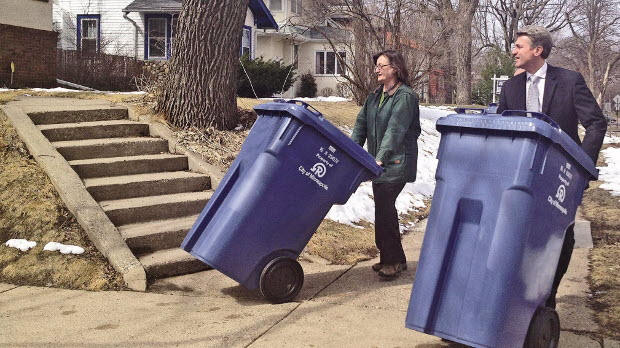Communities find advantages in waiting to introduce curbside recycling citywide
- August 22, 2013
- By Kerri Jansen
 Courtesy, city of Minneapolis
Minneapolis City Council Member Sandy Colvin Roy, left, and
Mayor R.T. Rybak deliver new recycling carts to raise awareness
for the city's expanded one-sort recycling program.
Courtesy, city of Minneapolis
Minneapolis City Council Member Sandy Colvin Roy, left, and
Mayor R.T. Rybak deliver new recycling carts to raise awareness
for the city's expanded one-sort recycling program. Advertisement
Editor's Note: This story appears in our commemorative issue, "40 Years of Curbside Recycling."
Though the first curbside recycling programs appeared in the early 1970s, some North American cities are still without citywide residential recycling programs four decades later.
Financial issues, lack of resident interest or any number of challenges can stall recycling programs before they catch on. Sometimes, however, waiting can end up an advantage.
Columbus, Ohio, launched its residential recycling program in June 2012. For 20 years the city had experimented with recycling pilots, but for financial reasons and other factors, no one program had ever been implemented citywide, said Erin Miller, environmental steward for the Office of the Mayor. The city had more than 200 drop-box locations for recycling as well as a subscription service that hovered around 5% participation.
Despite the city's other environmental initiatives — in 2011 the city was recognized as having the No. 1 Government Green Fleet in North America — the city had a reputation as lagging behind on environmental issues, Miller said.
"People could not grasp the fact that we were a green, sustainable city without the fundamental base of curbside recycling," she said. "We're doing amazing things, but without the base of basic recycling, our residents didn't believe it."
Atlanta, which kicked off its residential recycling program in October 2012, similarly had scattered recycling participation from residents, who used 18-gallon black bins for recyclables and were charged for larger carts.
Before the city rolled out its new recycling program, recycling rates were around 12.5%. Officials looked at other municipalities' recycling systems and devised a program they thought would be successful with the city's residents, said Jacquelyn Bridges, recycling director for the city.
Many residents were already requesting larger recycling bins, and "we decided that we were just going to start issuing them to everybody at no cost," Bridges said.
Columbus was able to avoid some difficulty in rolling out its residential recycling program by observing successful programs in other cities. Instead of going through a phase of using smaller bins, Columbus jumped straight to collecting recyclables in larger, 96-gallon carts.
"We didn't have to go through that painful step because we were starting from scratch," Miller said.
Columbus has recycled more than 25,000 tons since June 2012, averaging 2,500 tons per month now that all residents have received their carts. That translates into roughly $1.24 million saved on landfill fees. The city reported 98% participation when the carts were delivered and counted 74% participation during a one-week snapshot. That success could be partially due to the city's waiting so long to launch its program.
"One of the advantages was that there was kind of a pent-up demand from our residents, and so when we rolled out the program it was embraced greatly, because they'd been asking for it for a really long time, like 20 years," Miller said.
And people are more supportive of the city's "green" initiatives as a whole, she added: "It's changing the culture of the city."
Atlanta reported a recycling increase of around 55% from October 2012 to spring 2013. Only 1% of residents refused the new carts, and those were mostly people with space constraints or physical impairments, Bridges said.
"I think it was just more and more people started seeing the benefits of recycling, whether it was for the economy right here in Atlanta, or the environment, or just all of the benefits, people really just started to see how it could benefit residents here," Bridges said. "People just started getting on board with it so we wanted to make sure that everybody was able to get on board with it and participate in a program like that."
![]()
w w w . w a s t e r e c y c l i n g n e w s . c o m
copyright 2013 by Crain Communications Inc. All rights reserved.